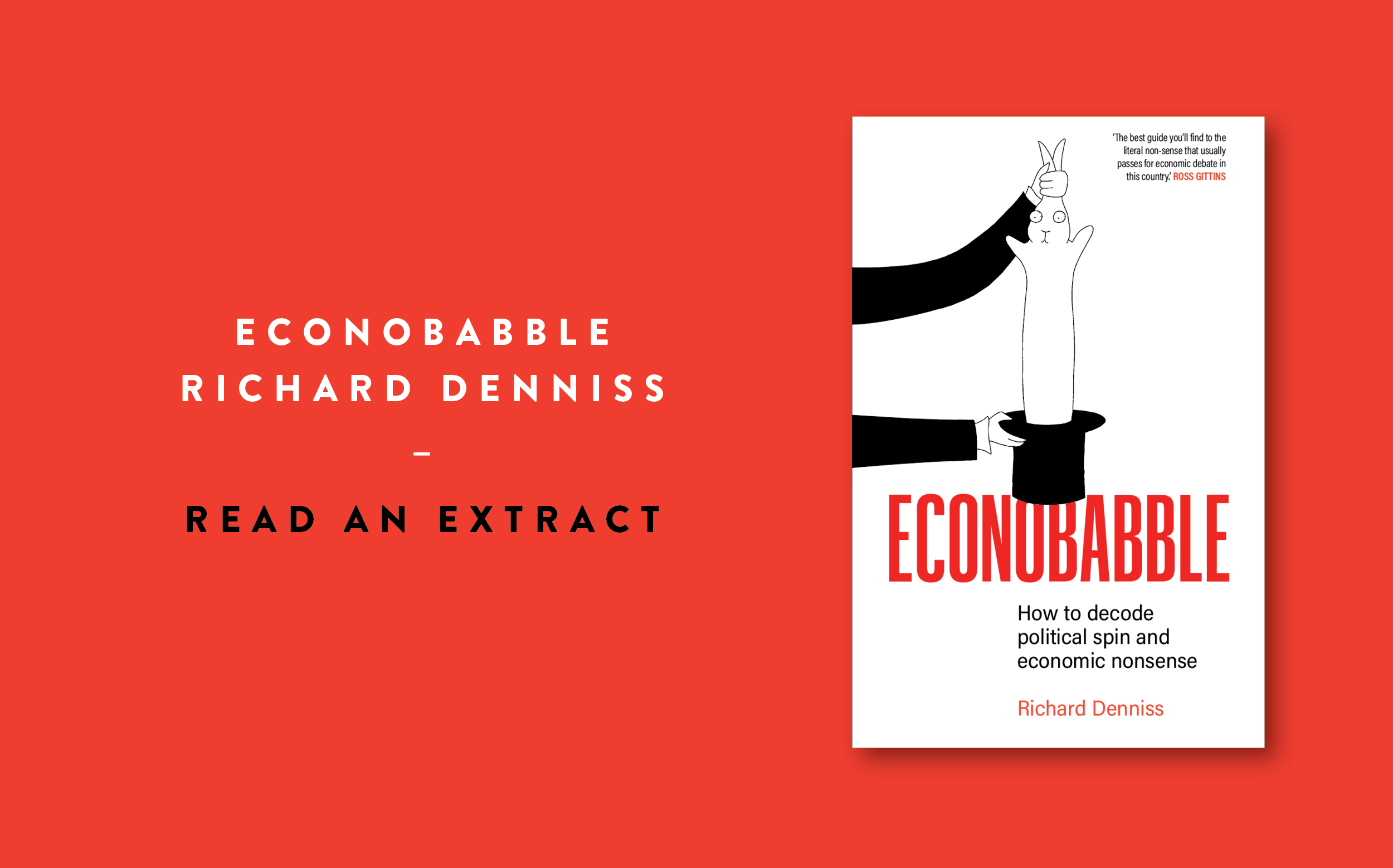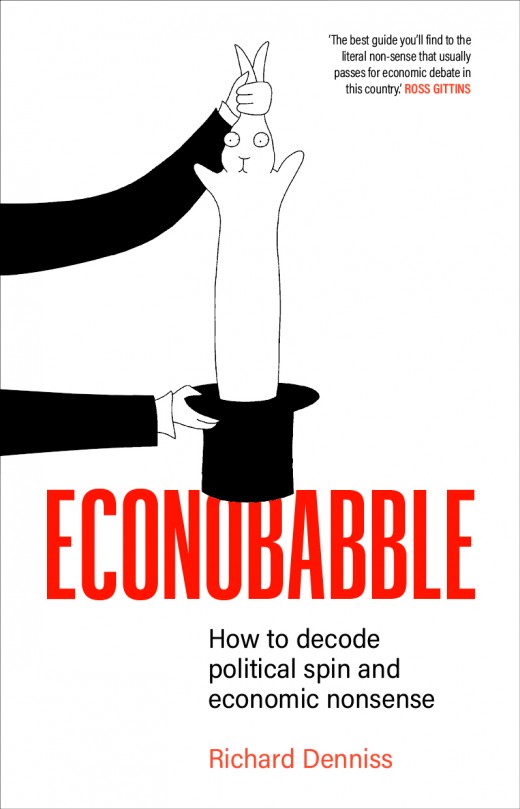News

News >
Read an extract: Econobabble
Read the introduction to the fully updated and expanded edition of Richard Denniss’s clear, witty guide to understanding political jargon about the economy.
Economics is like a tyre lever: it can be used to solve a problem, or to beat someone over the head. It’s not the tyre lever that is good or bad – it’s the person who wields it, and what they try to do with it.
Scott Morrison has made the distinction between ‘good’ and ‘bad’ central to his approach to economic management. According to the prime minister: ‘Australians understand taking out a mortgage to pay for their home is a wise investment for their future. But they also know that putting your everyday expenses on the credit card is not a good idea. It doesn’t end well. This is basically the difference between good and bad debt. The same is true for government.’
Except, of course, it’s not. Sometimes it makes sense to put your groceries on your credit card, especially if your car just broke down and needs repairs. And sometimes borrowing to buy a house is a bad idea, especially if you are borrowing to buy a house in a mining town at the end of a mining boom. Making choices is not easy, and while economics is all about the science of decision-making, that doesn’t mean economists know what is right and what is wrong – and it certainly doesn’t mean we know what the ‘best’ thing to do is, for a person, a company or a country.
Australia is one of the richest countries in the world. We can afford to do almost anything that any other country can do, but we can’t afford to do everything that every other country can do. We have to make choices, hard choices.
Economics has some simple but powerful analytical tools that can be used to help us make those choices, but no economist, and no economic model, can tell us what we ‘should’ or ‘must’ do. Like a waiter explaining a menu, economists can help explain the choices available, and can help us understand the cost of the different options, but just as it is not the job of a waiter to tell us what to eat, it is not the job of economists to tell us what we must do.
But economics is not just a set of analytical tools – it is also a powerful language that can conceal simple truths from the public. I call this language ‘econobabble’, and it includes two things: incomprehensible economic jargon, and apparently simple words that have been stripped of their normal meanings. When public figures and commentators use this sort of language in order to dress up their self-interest as the national interest, to make the absurd seem inevitable or the inequitable seem fair, or even to make the destructive seem prudent, they are econobabbling.
Every day, econobabble is used by powerful people to silence democratic debate about our nation’s priorities and values, and to conceal the full range of policy options that we have at our disposal. As the COVID-19 crisis has shown, Australia can afford to provide free childcare and to significantly increase unemployment benefits, and we all now know that there is nothing ‘reckless’ about running a large budget deficit. But for decades, econobabble has been used to hide these simple truths from the public. The aim of this book is to expose the stupid arguments, bizarre contradictions and complete lack of evidence which econobabble is designed to conceal.
I am sorry to say it, but in our nation today confidence is usually more important than qualifications. Bad economic arguments, without the faintest theoretical or empirical foundation, dominate public debate. Take Scott Morrison, for example. When asked by Leigh Sales, ‘Where is your evidence that higher taxes weaken an economy?’, the prime minister responded: ‘Well, I think it’s just fundamental Economics 101, Leigh.’
But, of course, it’s not. Such an opinion isn’t ‘fundamental’, and no ‘Economics 101’ textbook teaches students any such thing. Moreover, the claim is demonstrably wrong. The highest-taxed countries in the world, the Nordic nations, have some of the highest levels of income, life expectancy and happiness.
When nonsense is repeated often enough – especially by prime ministers, well-paid lobbyists, commentators and businesspeople – it can start to seem as though everyone believes that black is white or up is down, especially in the post-truth world of social media. After enough exposure to econobabble, you might even come to think that the best way to help poor people is to give tax cuts to the rich.
This book won’t train you as an economist. (Given the lack of qualifications of most people who spout econobabble, however, that shouldn’t worry you too much.) But it will give you the evidence, the arguments and, most importantly, the confidence to question assertions you might once have simply accepted, or lacked the confidence to challenge.
This book is for those who, deep down, have never believed that it makes sense, economic or otherwise, to help poor people by slashing public spending on the services they rely on. It’s for those who have a sneaking suspicion that it would be cheaper and better to avoid climate change and COVID-19 than to let them rip and cope with the consequences. And it’s for those who think it would be more efficient to reduce unemployment than to ship jobs offshore. It will show you how to take on those who pride themselves on being ‘great economic managers’ but then do nothing more than blame the unemployed for the lack of jobs – and then use dodgy algorithms to try to collect ‘robodebts’.
I’m not trying to convince you that economics is stupid – I don’t think it is. But I am trying to convince you to join the fight against people who use econobabble to conceal their self-interest. Just as you don’t need a black belt in karate to call out bullying when you see it, you don’t need an economics degree to call out bullshit when you hear it. Until enough of us name econobabble for what it is, our public debate will never have room for good ideas based on evidence, logic and our collective values.
This second edition comes five years after the first. When I finished writing the first edition in late 2015, it was hard to imagine that Donald Trump would be elected president of the United States, that Scott Morrison would become the prime minister of Australia, or that the COVID-19 pandemic would smash into so many lives and into the global economy. But while those three shocks are largely unrelated, they all come wrapped up in enormous amounts of econobabble, which, unless it is unpacked, will conceal the real choices, and the real motivations, of those we elect to represent us.
Economists don’t have all the answers. There is nothing in our theories or our data that can tell you, or a prime minister, what the ‘best’ tax, health, education or transport system is. Our training does not equip us to know what kind of society you want – it merely helps us to identify the likely costs and the likely benefits of different choices. The ultimate irony of using econobabble to convince people that ‘there is no choice’ when it comes to what is ‘good for the economy’ is that economics is, literally, all about helping people to make such choices. While Economics 101 does not teach students that tax is bad for the economy, it does teach students that they should never tell people what is good for them, and that they should always ask them what they want. Econobabble is the opposite of economics: it conceals choices and impedes genuine democratic debate about priorities. That’s why we need to decode it, and that’s why I have updated this book.
Econobabble: How to Decode Political Spin and Economic Nonsense is out now.
Share this post
About the author
Richard Denniss is chief economist at the Australia Institute. He is the author of Econobabble, Curing Affluenza and Dead Right, and the co-author of Affluenza. He writes for The Monthly, The Guardian, The Saturday Paper and the Australian Financial Review.
More about Richard Denniss




